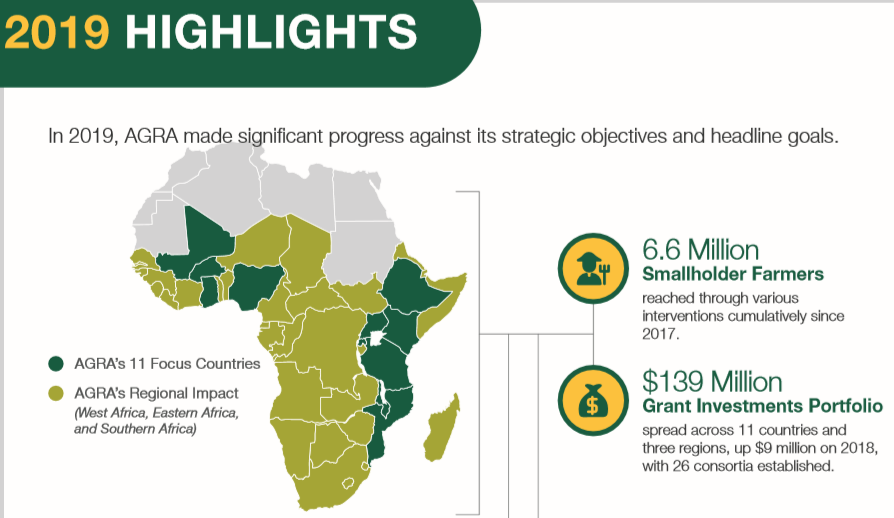ECOSOC at 80: Renewing Multilateralism in an Age of Global Uncertainty
On 23 January, the United Nations Economic and Social Council (ECOSOC) convened a commemorative session…
“Today, the agricultural sector is responsible for 65% of Africa’s employment, 35% of its GDP and 75% of its internal trade. The continent’s smallholder farmers (80% of the total population) are vibrant and inventive. Yet hundreds of millions of Africans go to bed hungry every night, imports dominate our markets, and farmers cannot access the seeds and fertilizers they need. Nor can they always get their goods to market or add value to their products to make a profit. A huge opportunity is being wasted.”
– H.E Hailemariam Desalegn Former Prime Minister of Ethiopia, Chair of the Board of Directors of AGRA
The 2019 annual report of the Alliance for a Green Revolution in Africa (AGRA) has been released. The report titled “Integration and Scale: Transforming the livelihoods and lives of smallholder farmers in Africa” focuses on AGRA’s integrated delivery model that seeks to drive agricultural transformation and enhance the livelihoods and lives of smallholder farmers in Africa. The report makes a compelling case of why, now more than ever, accelerating agricultural transformation in Africa is crucial. In the face of the COVID-19 pandemic, the report estimates that as many as 44 million Africans are likely to contract the disease resulting in enormous pressure on economies and agriculture, and calls for the protection of agricultural value chains and food systems. To avert an imminent food insecurity crisis, the report calls for support for farmers and agricultural SMEs to be placed at the heart of the response to the pandemic.
The report gives an overview of AGRA’s Strategy 2017-2021 which has the ultimate goal of transforming smallholder agriculture into a highly productive efficient, competitive, and sustainable system. The strategy seeks to increase incomes and improve food security for 30 million smallholder farming households in 11 focus countries – Burkina Faso, Ethiopia, Ghana, Kenya, Malawi, Mali, Mozambique, Nigeria, Rwanda, Tanzania and Uganda.
Through the three pillars of its Strategy – State Capability & Policy Engagement, Systems Development, and Partnerships – AGRA coordinated various activities in 2019 reaching 4,652, 390 farmers (32% female) with a portfolio of $139 million in grant investments spread across its 11 focus countries. AGRA made significant progress in 2019, specifically in the areas of financial leverage, technology access, local private sector engagement, markets and post-harvest management, extension services, and state capability & policy engagement.
In numbers, AGRA recorded remarkable success including:

Looking ahead in the face of the COVID-19 pandemic, AGRA is interested in tracking the food security situation and is looking at improve its resilience building capabilities and will continue to support governments to secure critical assistance to avert potential food crises in the region.
Through various case studies of activities AGRA is carrying out in the 11 focus countries, the report demonstrates the potential of partnerships to scale up agricultural transformation on the continent. The coming together of governments and non-state actors, particularly the private sector, to support smallholder farmers holds the promise of building resilient food systems.
AGRA’s model, if scaled up and replicated in other African countries, will definitely realize the green revolution that the organization represents and fulfill its vision – Africa can feed itself and the world, transforming agriculture from a solitary struggle to survive to a business that thrives.
ABOUT AGRA
Alliance for a Green Revolution in Africa (AGRA) is a partnership-driven institution that is African-led and farmer-centered. Founded in 2006, AGRA is transforming smallholder farming in Africa beyond the solitary struggle for survival, into thriving businesses. Its founding partners are the Bill and Melinda Gates Foundation as well as the Rockefeller Foundation. For nearly 10 years, AGRA’s work across 18 countries has focused on distinct problems related to seed production, soil health, and agriculture markets that were so profound and had been neglected for so long that they required a concentrated effort to resolve. AGRA was formed in 2006 in response to a call from former UN Secretary-General The late Kofi Annan, who said the time had come for African farmers to wage a “uniquely African Green Revolution.” With farmers at the center of all interventions, AGRA invests in building systems closer to the farm in order to drive productivity, access to markets, boost resilience and strengthen country and local private sector capability to scale systems and technologies. In the past decade, AGRA has been a strong voice for rural development, fostering a prosperous agricultural economy supporting thousands of farm-based businesses and 30 million African smallholder farming families in ways that ensure food security and improved livelihoods.